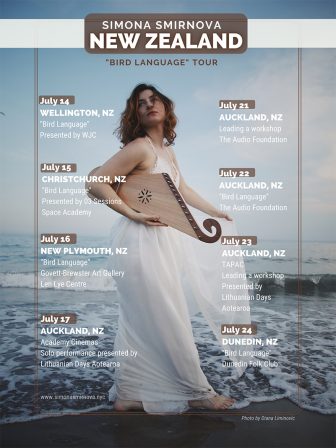Simona Smirnova: On Tour With Birds, Kanklés And Jazz Exotica
Simona Smirnova: On Tour With Birds, Kanklés And Jazz Exotica
New York City-based, Lithuania-born jazz-fusion artiste Simona Smirnova has just arrived in Aotearoa to tour the length of the country for the fourth time since 2018. Enthralled by her latest release ‘Bird Language’, Silke Hartung was inspired to find out more about Simona, her captivating work, birds, Bjork, archaic selves, and of course what kanklés are. Catch her live this July at a venue near you!
NZ must seem like such a faraway place from the rest of the world, especially when you’re from Lithuania! Can you tell us how you first visited NZ?
My best friend lives in Auckland, so that’s how this idea came about in the first place. I came to visit my friend and I managed to do a small tour in New Zealand and Australia in 2018.
That time I flew from Boston. I fell in love with NZ at the first sight. It’s such a vibrant and beautiful country with poetic landscapes, creative and warm people, attentive audiences and a very unique music scene.
Since then I moved to New York City and I have been coming every year with each trip extending the number of cities and shows. So, I came to NZ in 2018, 2019 and even made it in 2020 right before the pandemic, and this will be my fourth time! It has become a nice annual tour, plus a best friends’ reunion.
Your latest album is called ‘Bird Language’, and we do love our birds here! What was your concept for the production side of it?
‘Bird Language’ is an album about the human connection to nature and to one another. Each song celebrates our connection to seasons, plants, and the natural world around us. Musically it’s being represented through Lithuanian chants and seasonal folk songs, such as the one in the song called Solstice which features motifs from Lithuanian folk songs for the summer solstice. I use ethnic scales, which represent our connection to nature and to our archaic selves.
I am using extended vocal techniques and singing like a bird while directly imitating bird sounds with my voice. Music has lots of jazz improvisation and poetic lyrics about plants, earth, volcanoes and trees. The show is highly theatrical, interactive and from the audience’s perspective often perceived as one connected storyline.
I know that New Zealanders love birds… So do Lithuanians! That’s why we are connecting so well! Also, I would like to mention that I am dedicating this particular tour to the awareness of climate change.
How do you feel about comparisons made between yourself and Bjork? What aspects would you maybe agree with?
I love Bjork and her music. She also has a deep sense of space, land, earth beneath her feet. Maybe both of us are coming from smaller countries, operating from that same blueprint of archaic selves. Bjork’s sound is probably more electronic and ethereal than mine. ‘Bird Language’ has its jazz influences, lots of piano solos, which is not that common in Bjork’s music. We both are very visual – I love putting out visual representations such as music videos, colourful extravagant outfits on stage and photos. I love when my music has not only sonic representation but also a very strong visual identity, just like Bjork does, too.
As a touring artist in 2022, how do you find and connect to local support acts that compliment your own style?
I have been to NZ three times already, so through those years I found musicians I love to play with. Lots of times it came through venue recommendations. I love to lean into jazz scenes and collectives since that’s my background. All those who I’ve performed with before were amazing musicians and also presented my music in a new, unheard angle, which I love! I have made so many friendships and collaborations with NZ musicians since I started coming here.
NZ suffers something we call a ‘cultural cringe’ in regard to local art and traditions. Your playing a zither made me wonder how being able to play a distinctive local instrument is perceived in your native homeland vs overseas.
I haven’t performed on my zither in Lithuania that much, most of my professional life was spent in the US. I only studied it and performed in traditional folk and classical styles, which is the most common there.
I only started pushing the boundaries and exploring different, more uncanny ways of playing the zither when I moved to Boston to study at Berklee College of Music, which was about 10 years ago.
My ethnic zither (called kanklės) draws a lot of attention and by international audiences, it’s always perceived with great curiosity. There is not a single show without someone coming up to me after and asking, “What’s this thing you are playing with? What is it called?”
I think people always appreciate folk music and instruments overseas more than in the country where they originated from.
What can new audiences expect to hear and see during one of your concerts this July?
‘Bird Language’ is a theatrical, sultry, jazzy and interactive show. As described by the press, the music is “Eastern European tinged jazz/exotica”. People will hear lots of melodic singing, jazz improvisation, vocally imitating bird sounds, ethnic zither sounds and elements of Lithuanian folk chants. The show is a combination of pop, jazz and chamber music.
‘Bird Language’ shows will be presented on July 14 in Wellington, July 15 in Christchurch, July 16 in New Plymouth, July 22 in Auckland, and July 24 in Dunedin. I am also leading a couple of workshops on ethnic singing at TAPAC (The Auckland Performing Arts Center) on July 23 and on interdisciplinary performance at The Audio Foundation on July 21.


